Creating a safe space on Universal Children’s Day
By Jennifer Brookland and Maggie FarrandNovember 20, 2013
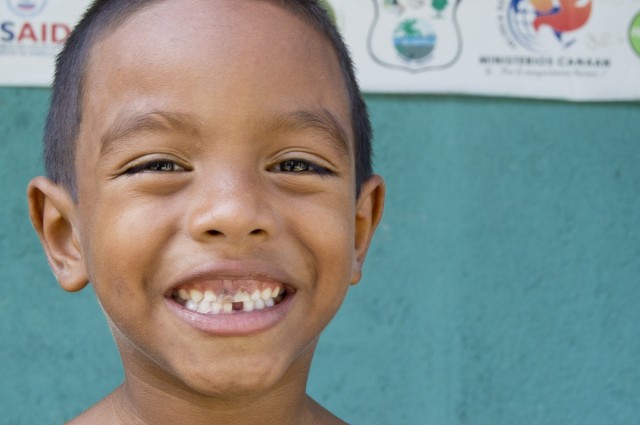
There is energy and hope in the smiles of children – even when they live amidst insecurity and violence. Too often, kids are vulnerable to exploitation, at risk of dropping out of school and made to feel small.
Creative Associates International is dedicated to extending access to education for these children. Education is even more important and needed in areas of conflict; that is where Creative specializes, ensuring children have the opportunities they deserve.
Creative’s successful post-conflict education work began in 1989 in Central America, where it used education to complement disarmament, demobilization and repatriation of youth combatants and their families into society.
Since then, it has implemented critical education interventions in more than 26 conflict, post-conflict and crisis-affected countries—including Afghanistan, Iraq, Uganda, South Sudan, Honduras and Yemen. Today, Creative has ongoing education projects in nine countries.
See how Creative’s current projects in Yemen, Central America, Nigeria and Jordan are carving out safe spaces for kids >
Protecting education for girls in Yemen
Rehabilitating the Sad Batais School in Yemen wasn’t just about improving the school’s infrastructure; it was about ensuring the school was once again a safe place for the area children – especially young girls.
In 2011, Al Qaeda militants occupied numerous schools in Yemen’s Abyan district in order to launch attacks, displacing upwards of 200,000 people and emptying the area schools. A year later, the government of Yemen used military action to retake the area. The government was successful, but fighting left many explosive devices and unexploded bombs on school grounds.
Today, Creative and the communities are rehabilitating these schools, making them safe again for students. It’s part of the larger Creative-implemented Community Livelihoods Project, which builds community capacity and provides healthcare and agricultural training to marginalized populations. It is supported by the U.S. Agency for International Development.
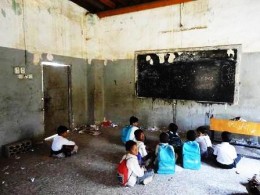
School rehabilitation is paired with a robust early grade reading program, so students return to school and, for the first time, learn how to read and write at grade level.
In Yemen, only 53 percent of young girls who begin primary school actually complete it. When schools themselves are unsafe, graduation rates can be drastically lower. Rehabilitation projects like the one at Sad Batais School, paired with a focused, proven early-grade reading program, ensure young girls stay in school and stay safe.
To date, the rehabilitation of schools in Abyan has allowed more than 11,000 students to return to classes.
A safe space to come together in Central America
Pastor Richards used to look outside at night and see children. Alone, on the streets, vulnerable and bored. They were easy targets for recruitment by gangs who controlled various tracts of his Panama City neighborhood, or worse: for stray bullets.
Today, Pastor Richards sees these kids even more frequently. They are safe inside the youth Outreach Center he runs, playing games, reading books, using computers and learning to play the drums. Here, children and teens have an outlet for their energy through soccer games, learn new skills through tutoring and vocational training, and find mentors and friends.
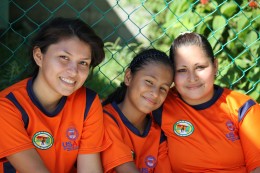
The Center is part of a network of youth Outreach Centers across Panama, Honduras, El Salvador and Guatemala. Creative began constructing them in 2006. The thousands of young people who use the Centers find something rare in violent neighborhoods: a safe space where they can just be kids.
Panama City police units, which used to patrol the area to mete out punishment, have established relationships with the children at the Centers, who are starting to see them as allies and protectors instead of enemies.
In El Salvador, Creative is working with the local and national government officials to provide crime and violence prevention coverage to 55 at-risk municipalities.
In Honduras, it has engaged major companies, which provide volunteers and resources to outfit the outreach centers with books, furniture and other supplies that give kids a secure environment to excel.
At Pastor Richards’ Center and others like it across Central America, at-risk kids are able to stay safe, and connect with one another no matter which block they go home to.
Securing children’s future in Northern Nigeria
For 9 million Nigerian children, school has little to do with learning basic reading and math. They are enrolled in Tsangaye centers—traditional Koranic schools where class time is typically spent memorizing and reciting verses from the Quran. These centers usually double as orphanages for vulnerable kids whose families cannot afford to keep them at home. Children who live there are often sent out to beg on the streets of Northern Nigeria, leaving them even more susceptible to exploitation and violence.
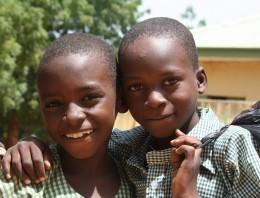
Although Tsangaye centers have been around for five or six centuries, the government of Nigeria recognized that the children who attend these schools were losing out on receiving a comprehensive education and a path out of poverty. They were also put at risk out on the streets alone.
Through the Nigeria Northern Education Initiative, Creative and the Nigerian government partnered to deliver math, reading and life skills to orphans and vulnerable children at Tsangaye centers in Bauchi and Sokoto states.
With funding from USAID, the program brought teachers together with Mallams— traditional Koranic schoolmasters—to promote secular education in a religiously and culturally sensitive way. It established non-formal learning centers and trained facilitators who could work within the Koranic schools to introduce important subjects, health information and psychosocial support.
By mastering core subjects, children have a chance to study their way into formal schools—and off the streets.
Creating healthy school environments in Jordan
At the A’bel Primary Mixed School, students were afraid of Hanin Hanaifat, a 10th grader who spent her days verbally and even physically abusing her classmates. Many students in Jordan report being bullied aggressively in school—especially kids whose families belong to lower social classes. With little class time devoted to life skills or counseling, many of them feel alone and scared at school.
Through the USAID-funded Learning Environment Technical Support (LETS) program, teachers, principals and students are coming together to improve the learning environment in 120 public schools. The program focuses on four main domains: safety, health, caring and engaging.
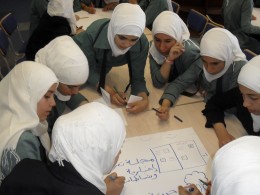
Teachers and the principal at Hanin Hanaifat’s school recognized that increasing the safety and caring at A’bel Primary was paramount. Through the LETS program, they implemented an anti-bullying campaign, with Hanin at the center.
Thanks to the program, Hanin came to understand how her behavior was creating a negative environment for her classmates. But she also learned that she could make a change.
Practicing what she learned in the trainings, she has been able to make friends, and her classmates are no longer afraid of her.
For children in these Jordanian schools, going to class is finally becoming something to look forward to. Students and teachers are rallying to make sure children have a healthy school environment, where everyone feels safe to simply learn.
